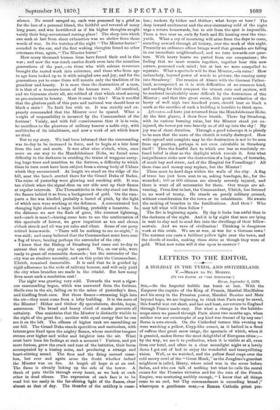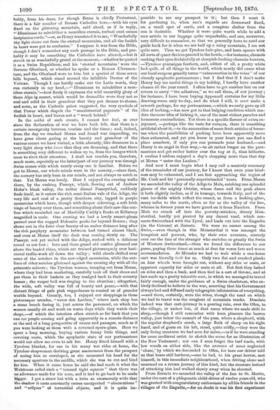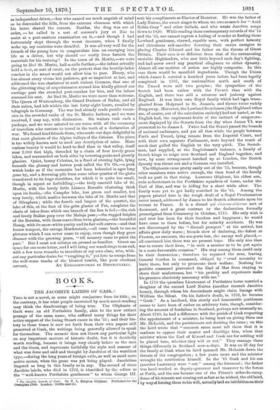LETTERS TO THE EDITOR.
(TO THE EDITOR, OF "THE SPEOTATOH.".] Berne, September 3, 1870. SIR,—S0 the Imperial bubble has burst at last. With the Emperor the captive of the King of Prussia, Marshal MacMahon and his army in the Prussian power, Marshal Bazaine and Metz beyond hope, we are beginning to think that Paris may be saved, this fearful war cut short, and last and least, our return to England through France made easy. But what a change in the kaleido- scope since we passed through Paris about two months ago, when neither war nor catastrophe of any kind was dreamt of by any one ! Berne is awe-struck. On the Cathedral terrace this evening we were watching a yellow, Cuyp-like sunset, as it bathed in a flood of saffron that great snow range, the spectacle of which, when it is granted, makes Berne the most delightful of European cities ;- by the way, we see it to perfection, when it is visible at all, even from our hotel, and often in a clear moonlight night or a lovely dawn I get out of bed to enjoy the wonderful and tranquillizing vision. Well, as we watched, and the yellow flood crept over the cold snowy cowl of the " Great Monk," as the Jungfrau's grandest neighbour is called, Henry, whose mind was in the scene before Sedan, and who can talk of nothing but what he calls the moral causes for the Prussian victories and for the ruin of the French Empire, was muttering audibly enough, " I know that all things come to an end, but Thy commandment is exceeding broad ;" whereupon a gentleman near,—a Roman Catholic priest pro-
bably, from his dress, for though Berne is chiefly Protestant, there is a fair number of Roman Catholics here,—with his eyes fixed on the glittering mountain, said aloud, as if in reply, "Illuminans tu mirabiliter a montibus eternis, turbati aunt omnes insipientes corde,"—or, as Henry translated it to me, " Wonderfully thy light shone out from the eternal mountains, and all the foolish in heart were put to confusion." I suppose it was from the Bible, though I don't remember any such passage in the Bible, and pro- bably it may be something the Catholics have altered,—but it struck us as wonderfully grand at the moment,—whether he quoted it as a Swiss Republican, and his eternal mountains' were the Bernese Oberland, or whether he spoke as a Roman Ultramon- tane, and the Oberland were to him but a symbol of those seven hills beyond, which stand around the infallible Doctor of the Vatican. Though I can hardly make out the Latin words, they run curiously in my head,—" Illuminans tu mirabiliter a mon- tibus eternis,"—how finely it expresses the wild unearthly glory of these Alps in sunset, which would be dreamlike were they not so real and solid in their grandeur that they put dreams to shame, and seem, as the Catholic priest suggested, the very symbols of that Power which dispels the "unsubstantial pageants" of the foolish in heart, and leaves not a " wrack behind."
In the midst of such events, I cannot but feel, as ever since the declaration of war we have both felt, that there is a certain incongruity between tourists and the times ; and, indeed, from the day we reached Meran and found war impending, we have gone about gazing at the beauty and grandeur of the various scenes we have visited, a little absently, like dreamers in a very light sleep who know that they are dreaming, and that there is something very different to waken up to, from the images which seem to rivet their attention. I shall not trouble you, therefore, much more, especially as the latterpart of our journey was through Swiss scenes with which nearly every one is familiar. Before we got to Meran, our whole minds were in the scenery,—since then, the scenery has only been in our minds, and not always so much as that. Yet Meran was lovely. How I enjoyed the evening walks there, by the rushing Passeyr, which, flowing out of Andrew Hofer's bleak valley, the rather dismal Passeyrthal, suddenly finds itself, as it enters the rich semi-Italian vale of the Adige, the very life and soul of a pretty Southern city, lapped in purple mountains which have, though with deeper colouring, a soft Irish tinge of beauty over them, and something about their saw-like out- line which reminded me of MacGilly Cuddy's Reeks at Killarney magnified in scale. One evening we had a lovely sunset-gleam poured over the rugged Dolomite peaks far beyond Botzen ; they shone out in the faint clear beauty of an amber distance long after the rich porphyry mountains between had turned almost black, and even at Meran itself the dusk was coming slowly on. The Passeyr, not yet united with the Adige, rushed with a delicious sound at our feet ; here and there grand old castles gleamed out above the loaded vines, which are trained picturesquely over hori- zontal trellis-work all down the valley ; wild clouds drifted over some of the notches in the saw-edged mountains, while the out- lines of other notches glistened against the evening sky with all the prismatic colours ; the Tyrolese women, trooping out from Meran, where they had been marketing, carefully took off their shoes and put them in their baskets as they trudged back to their country homes ; the vesper bell was ringing in the churches ; altogether, the wide, soft valley was full of beauty and peace,—with that distant fringe of pale pink ruggednesas to remind us of grander worlds beyond. Greatly, too, I enjoyed our shoppings in those picturesque arcades, " unter den Lauben," where each shop has a stone bench facing it, just across the pavement, on which the women usually sit and work on warm days while they watch their shops,—of which the interiors often stretch so far back that you can see people coming and going apparently in a remote distance at the end of a long perspective of rooms and passages, much as if you were looking at them with a reversed opera-glass. Here we spent a long morning, buying various funny little things, and coveting more, which the apoplectic state of our portmanteau would not allow me even to ask for. Henry fitted himself with a Tyrolese blanket, for use in his many wet rides at home, the Tyrolese ahopwoman deriving great amusement from the prospect of seeing him so enveloped, as she measured his head for the necessary aperture in the middle, which she was to cut and bind for him. When it came home he said she had made it what the Welshman called such a " tamned tight squeeze" that there was no allowance made for his nose, and it had to go back to be made bigger. I got a straw hat with a brim so enormously wide that the shadow it casts constantly causes unexpected " obseurations " and " eclipsea " of terrestrial objects, and it is quite im-
possible to see any prospect in it ; but then I want it for gardening in, when one's regards are downward fixed, on a small spot of earth, and a complete shelter from the sun is desirable. Whether it were quite worth while to add a new article to our luggage quite unpackable, and one, moreover, very difficult to remember, so that we generally have to send our guide back for it when we are half up a rainy mountain, I am not quite sure. Then we got Tyrolese hair-pins, and horn spoons with all sorts of queer devices painted in the bowls,—for instance, chamois cocking their eyes disdainfully at sheepish-looking chamois-hunters, —Tyrolese ptarmigan feathers, and, oddest of all, a pretty white bed-quilt, of all things in the world, which nearly did cause what our local surgeon grandly terms " extravasation in the veins" of our already apoplectic portmanteau ; but I find that if I don't make Henry buy me useful things in my holiday, I hardly have another chance all the year round. I often have to get another box on our return to carry "the adhesives," as we call them, of our journey ; for instance, I have been buying Appenzell curtains for my little drawing-room only to-day, and do what I will, it must make a seventh package, for my portmanteau,—which we early gave up all idea of locking,—has now got to that bulging condition which ren- ders the mere idea of locking it, one of the most violent paradox and humorous contradiction. Yet there is a specific flavour of extra en- joyment, —perhaps like the taste for euracoa, there is something artificial about it,—in the annexation of some fresh articles of home- use when the possibilities of packing have been apparently more than exhausted, and yet you know in your heart you can find a place somehow, if only you can persuade your husband,—and Henry is an angel in that way,—to sit rather longer on the port- manteau and get rather hotter over the tug at it, than hitherto. I confess I seldom enjoyed a day's shopping more than that day at Meran " unter den Lauben."
And now I must begin what I may call a masterly summary of the remainder of our journey, for I know that even your kind- ness may be exhausted, and I am fast approaching the region of Mr. Cook and his personally-superintended' tours. From Meran we ascended the valley of the Adige to Mals, catching one splendid glance of the mighty Orteler, whose dome and the peak above it both slightly incline, as if in homage, towards Italy, and of the vast ice-fields which reflect the sunset, as from a looking-glass, many miles to the north, often as far as the valley of the Inn, whence in former years we have gazed on it from Nauders. From Mals we struck off into the poverty-stricken, dreary Miin- sterthal, hardly yet pierced by any decent road, which con- nects Switzerland with the Tyrol, and leads out into the Engadin. (in the Grisons) at Zernetz. We were no sooner among the Swiss,—even though in this Miinsterthal it was amongst the hungriest and poorest, who, by their own accounts, scarcely ever see the face of the stranger who enriches so greatly the Swiss of Western Switzerland,—than we found the difference to our purse, paying three times as much at first for worse fare and worse accommodation. At Miinster we had to wait while a one-horse cart was literally built for us. Only two flat and cracked planks on four wheels were brought out, without any sides or seats, or apparent capacity for sides or seats at all. But first they lashed on sides and then a back, and then tied in a sort of throne, and at last made up a pretty tolerable cart, in which we managed to travel fairly enough, under the guidance of a Swiss charioteer, who en- tirely declined to believe in the war, asserting that his Government always had and diffused early telegraphic information of everything, —and there, certainly, were the wires, though the road on which we had to travel was the roughest of mountain tracks. Desolate indeed was that cart-journey in a pouring rain, over the Ofen, to the village, or rather hut, of that name where we made shift to sleep,—though I still remember with keen pleasure the barren valley, just below the summit of the pass, where a shepherd, with the regular shepherd's crook, a large flock of sheep on his right hand, and of goats on his left, stood, quite stiffly, —they were the only living creatures we had seen for miles,—as if he were standing for some mediaeval artist to sketch the scene for an illustration of the New Testament; nor can I soon forget the turf roads, with low woods on either side, like the avenues of some neglected ' chase,' by which we descended to Ofen, for here our driver told us that bears still harbour,—one he had, to his great horror, met himself, in this immediate neighbourhood, when driving alone and unarmed on a return journey of this kind, but the creature instead of attacking him had walked slowly away when he shouted.
From Zernetz we ascended the valley of the Inn to St. Moritz, under the care of a phlegmatic child-driver of twelve years old, who was greeted with congratulatory enthusiasm by all his friends in the villages of the Engadin,—for no doubt it was his first experiment as independent driver,—but who caused me much anguish of mind as he descended the hills, from the extreme closeness with which his horse shaved the corners. Besides, the drag was out of order, — he called in a sort of coroner's jury at Liz to assist at a post-mortem examination on it, —and though I had fortunately slept through the worst descents, when I finally woke up, my anxieties were dreadful. It was all very well for the friends of the young hero to congratulate him on emerging into life as a driver, but why should our costly lives furnish the materials for his training? In the town of St. Moritz,—we were going to Bad St. Moritz, half-a-mile further,—the infant actually held a levie, or sort of court, on the pretext that the heavily-laden coaches in the street would not allow him to pass. Henry, who has almost every virtue but patience, got so impatient at last, and addressed the wee charioteer in such violent German, that one of the glittering ring of acquaintances around him kindly piloted our carriage past the crowded post-coaches for him, and the infant resumed his seat. At Bad St. Moritz we were more than welcome. The Queen of Wiirtemberg, the Grand Duchess of Baden, and all their suites, had left within the last forty-eight hours, recalled by telegraph to Germany. The war had already made pacific vacan- cies in the crowded ranks of the St. Moritz bathers, and we were received, I may say, with distinction. Six waiters took each a package, and we were ushered to our room with all the ceremony of travellers who venture to travel in the teeth of a declaration of war. We found kind friends there, who made our days delightful in that most glorious of the Alpine valleys of the Grisona. The place is too widely known now to need any description of mine. More various beauty it would be hard to find than in that valley, itself near 7,000 feet high, threaded by a chain of four lovely green lakes, and surrounded on both sides by towering peaks and ghostly glaciers. Quiet, bonny Celerina, in a flood of evening light, lying beneath the gloomy and barren peak called the Piz Ot,—a peak which looks as if the mountain had been beheaded in ages long gone by, and a frowning pile from some other quarter of the globe transferred to its huge shoulders, for which it is quite too small, though in aspect so forbidding ;—the truly emerald lake of St. Moritz, with the lovely little Linnma Borealis clustering thick upon its banks,—the Campfer lake, less green and smaller, but very lovely, which nestles between the lake of St. Moritz and that of Silvaplana ; while the fourth and largest of the quartet, the lake of Sils, at the foot of the grim glacier of Fex, completes the chain of lakes from which one branch of the Inn is fed ;—the rich and lovely Italian peep over the Maloja pass ;—the rugged heights of the Bernina, with those marvellous twin glaciers,—the beautiful Roseg, with its snow-white purity and its fair soft curves—and that frozen tempest, the savage blorderatsch,—all come back to me as pictures which I can never cease to enjoy, even though they grow dimmer with the growing years, " till memory cease to paint the past." But I must not enlarge on ground so familiar. Grant me space for one more letter, and I will bring our wanderings to an end, with a few terse remarks to travellers of my own class, who, with- out any particular desire for "roughing it," yet love to escape from the well-worn tracks of the bloated tourist, like your obedient servant, AN ENGLISHWOMAN IN DIFFICULTIES.
































 Previous page
Previous page